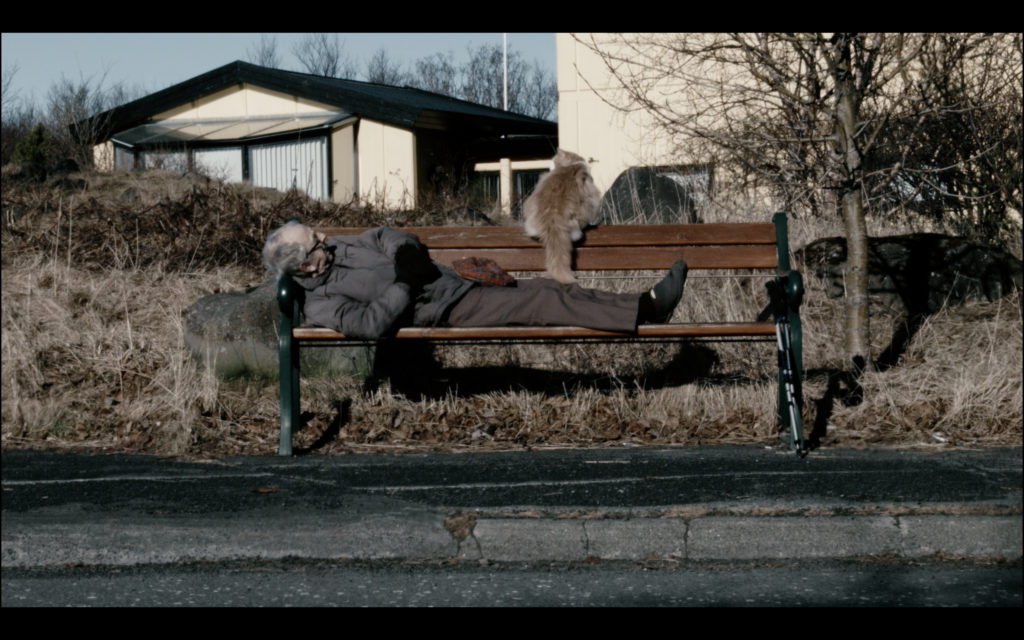The film Half Elf (2020) is a piece of cinematic genius, managing to negotiate between lighthearted sweetness and the intense processes of ageing. It sucks us into the raw landscape, chilling us with the brutal waves and craggy rocks, bleak yet hauntingly stunning depictions of the Icelandic town. These aesthetic triumphs make the warmth of Trausti and Hulda’s house even more inviting. The film opens with a phone conversation between the protagonist Trausti and his grandson, the filmmaker. He explains a dream in which elves make him sing for them, all through the night. Trausti doesn’t stop singing throughout the film. It is poetically punctuated by these rhythmic, almost chant-like folk tales he sings of the lost sailors who never reached home, cats, fjords and the winds. Jon Bjarki Magnusson intricately weaves together a ‘modern Icelandic fairytale’, inviting us to explore the life of the lightkeeper preparing for death and his wishes to integrate ‘elf’ into his identity.

The delicate soundscaping of this film draws the viewer into a dream-like state as we are invited into the normality of the everyday existence of Trausti and his wife Hulda. We hear the radio, telling tales of elves and their limericks, the songs of the couple, the ticking of the clock, the hum of the electrical appliances and the scuffle of their shoes on the floor. You become part of their world.
We see them together, their slippers almost touching under the table as a delicate portrayal of intimacy. It is a privilege to witness their relationship and be invited in. Hulda doesn’t like the attention, telling him he’s a show-off. This comes to a head when we see Trausti waving his arms around. She asks what he’s doing and he replies that it’s his sailor dance. Her dismissive response was to ask him if it’s supposed to be funny and that it has left her speechless. Trausti replies ‘it’s good she’s speechless’; painting a picture of the domestic familiarity of their 70 years together, arguing about the future of books and gossiping about neighbours.
Jon Bjarki Magnusson successfully manages to capture the beauty of the everyday and the challenges of elderly life showing Trausti as he struggles to turn on the digitised cooker, falls asleep at the table in the mornings and complains of worsening hearing. This does what I believe anthropology is so well placed to do, allowing us into other realities and leading to new kinds of quiet and inner understandings.
This film is a complex parley between the light hearted adolescent-like excitement and charm of the elderly lightkeeper, as he explores his elf identity. Showing us his playful energy, he remarks that when he was younger he decided he would always be ‘a little fool’, never a ‘sage old man’. He comes across as lovable and comedic, in eccentric yet perfect moments such as the scene with him lying across a bench outside playing with a particularly fluffy cat as he tells us that an Elf told him he will not drown in the ocean.
The opposition between the domestic regularity and the encounters with the nurses and clinical hospital environments is where we are reminded of the fragility of an individual near the end of his life. Towards the end of the film you see him in his hospital bed as he explains to the camera in a poignant moment, ‘these tears just fall by themselves, I am not asking them too’, and we are confronted with the realisation he will soon be leaving his earthly body.
Running alongside this joyful presentation of a sprightly man, is a more intimate engagement with a man preparing for his death. We hear about and are shown his coffin, witnessing his textural engagement with it as he admires the craftsmanship of it’s smooth wood. It comes across as strangely unremarkable, like shopping for a car or a coat. Yet, we are reminded that when the coffin seller says not to worry as the coffin is waiting for him, it is waiting for his death. This is further accentuated when he explains ‘the worms will naturally eat your flesh’, hauntingly reminding us of his earlier comment ‘I love this life and don’t want to die’. Producing a skillful emotional engagement, this fear sits deep in the pit of our stomach throughout the film. There is the realisation that none of our bodies are safe from decay, no matter how young at heart we are. The dread of an end point culminates as we witness the funeral of the Half Elf we’ve grown to love throughout the film through Magnusson´s personal portrayal of his grandfather. Yet, there is a bleak calm in the moment of his burial as his kin lower him into the snow-clad ground in the blizzard. We are invited to attend his 100th birthday celebration and his final identification as the ‘Grand Elf’.
This film is beautifully intimate and personal, showcasing the merits of how ethnographic film can allow us into homes, families, life and death. The slow depiction of daily life feels comforting, as if we are invited to come sit at their table, look at their photos, listen to their stories and the radio, to sing along. With an almost meditative quality, we rest here and dwell. It felt like a privilege to be taken on the journey as Trausti embarks towards his earthly death. We are thrown into the past through Trausti’s stories of his grandmother and enchanted rocks, and dismay from his wife about his elfish fascination, trapped between old and new, just as he is in the liminal period between life and death.
Trausti’s body looks almost asleep in his death and as we watch the lighthouse call out into the night for the last time, leaving us reflecting on our own existence, whilst finding the beauty, fragility and fun in life, perhaps encouraginging us to invite out the little elfish foolishness we harbour within ourselves.